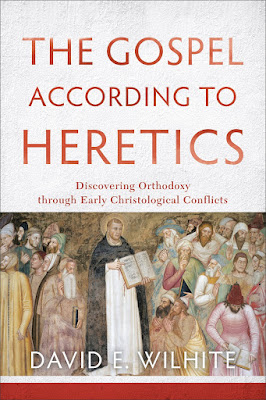Book Review: The Gospel According to Heretics

David E. Wilhite, The Gospel According to Heretics. Baker Academic, 2015. 290 pages.
Heresy
David Wilhite is professor of theology at George W. Truett Theological Seminary. His work, The Gospel According to the Heretics, is a sympathetic recounting early Christological heresies.
Wilhite opens his book with his definition of heresy and orthodoxy. Here, he weighs the tension between orthodoxy and heresy. He also alerts the reader that his book is a unique coverage of heretics because he is writing sympathetically. Wilhite strives to show, accurately, that much of what we know about the heretics and the heresies come from the orthodox victors. Inevitably, Wilhite argues, our perception of the early heretics are not as precise as they could be. Following this introduction are ten chapters, each of presenting a sketch of the heretic and his heresy:
1. Marcion: Supersessionsim
2. Ebion: Adoptionism
3. Gnostics: Docetism
4. Sabellius: Modalism
5. Arius: Subordinationsim
6. Apollinaris: Subhumanism
7. Nestorius: Dyoprosptism
8. Eutyches: Monophysitism
9. Iconoclasts: Antirepresnationalism
10. Muslims: Reductionism
The Complexity of History
History is very complex. Historical events are rarely so simple as we present them. Wilhite’s strength and weakness is his presentation of these heretics and heresies. Strength: It is intriguing to read deeper on the heretics and heresies than a surface level text book presentation. Weakness: Because of this presentation, Wilhite’s book is not ideal for first exposure to heretics and heresies. A more beneficial introduction to heresy would be something like Alister McGrath’s Heresy, or Roger E. Olson’s Counterfeit Christianity.
Below are some recurring themes, that have present parallels, that I took from this volume:
1. Heretics don’t wear red (or carry pitchforks). Not all heretics were malicious in intent.
2. Followers carry ideas further than the founder.
3. Right believers can be nasty.
Conclusion
While I would not recommend Wilhite’s book as a first option to studying heresy it is, overall, worth reading. He writes clearly and winsomely, is well researched, and provides a human glimpse at both the heretics and their orthodox opponents, both of whom are often just names and positions on a page. Because strands of these heresies are still alive today, works like this one are helpful to study—past perspective brings present clarity. For a discerning reader (and all of us should be discerning) this volume can be helpful.
4 out of 5 Green Chiles
Disclosure: I received this book from Baker Academic in exchange for an honest review.

Comments
Post a Comment